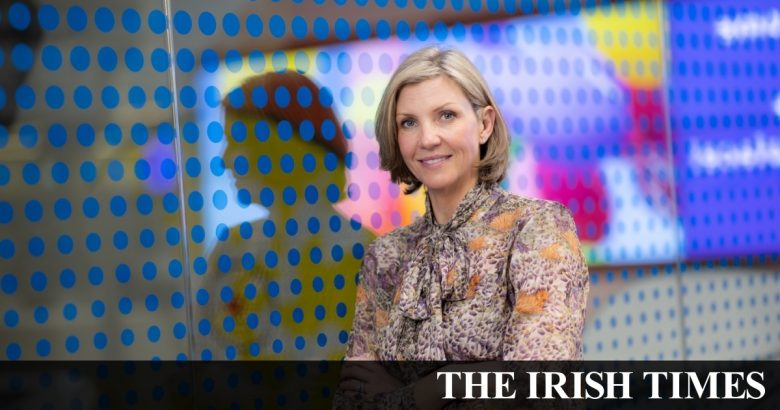Sign up for alerts from The Irish Times
Just click on “Allow Notifications” on the message appearing on your browser to activate them.
We will send you a quick reminder in the future, in case you change your mind.
Deborah Threadgold: ‘As long as you’re learning something and being tested, because no-one should go into a job they find easy’
When Deborah Threadgold joined IBM 25 years ago, she didn’t have a grand plan to eventually take over the top job in Ireland. The Dublin-born general manager of IBM Ireland doesn’t come from a tech-heavy background, but the skills she has picked up along what she described as “the windy road to IBM” made her the natural pick for the job when it opened up.
“Fanciful notions, is how I describe it,” she says, recalling the one-to-one meeting that then manager William Burgess always had with new managers at the company. “I remember thinking it would be quite interesting to come back here and be general manager, and wouldn’t it be really cool if I was the first female general manager.”
And, 24 years later, Threadgold was back in Dublin, taking up the job that she once described as “fanciful notions”.
It wasn’t always the goal. Threadgold didn’t have a plan for her career mapped out from her teenage years that involved a business degree and rise to the top of corporate Ireland. Despite a natural aptitude for school, she didn’t immediately enter third-level education.
“I found myself coming out of sixth year and I had no plan. I was 16 years old, not sure what I was going to do,” she says. “I had no great ambitions, I didn’t know what I was going to do. I suppose back all those years ago, I didn’t understand the opportunities the world could bring.”
A stint in secretarial college landed her a job as a receptionist in a small insurance brokerage in Dublin, where she was encouraged to go further. “I was very lucky in this first job I did to have a friend who sort of tapped me on the shoulder and said ‘Ok, stop messing around, you need to do something’.”
That kicked off 10 years of evening study in marketing that turned into a job in London with a not-for-profit pensions company.
Technology still wasn’t a major consideration, but Threadgold says she felt she needed to prove herself because she wasn’t a specialist in pensions. More evening study, at a faster pace, and she was getting herself noticed. The chief executive of the company, perhaps spotting her ambition and potential, created a role for her at the company and sponsored Threadgold’s MBA.
“That’s really, I think, one of the most pivotal moments of my career,” she says. “Someone took an interest in me and supported me.”
It was also her introduction to IBM, who came in to implement a pensions system. Threadgold was the person dealing with the tech giant, and one move back to Dublin later, she joined IBM Ireland as a consultant.
That started her career trajectory in the company, which would see her become a manager, despite her reservations, and take up a number of different roles within the company.
“I’d never managed people before, and I quite liked what I was doing,” she said. “My manager at the time said you could be a consultant whenever you want to be, but they might not ask you to be a manager again. I took that job.”
Again, a nudge pointed her in the right direction. If she hadn’t had that support and encouragement, who knows where she would have ended up?
Potentially still in the UK, with her family. She married an Englishman, she says, and had been living there for some time before the opportunity to go back to Ireland again presented itself.
Only a few months before, the family had bought a new house and begun renovation work. Then the tap on the shoulder, the nudge, and Threadgold was on her way back to Dublin. So they packed up their home, their three sons, sold the house and moved to Dublin.
IBM’s Irish operation is now much bigger – it added 400 jobs over the course of the pandemic alone, and recently announced it would recruit an additional 200. It already employs more than 3,000 people across Dublin, Cork and Galway. IBM Ireland, it seems, is thriving.
The return to Dublin also means that Threadgold is closer to family again, and can also return to some of her former hobbies. A keen swimmer – she once swam competitively – she is now determined to get into sea swimming. The dry-robe remains a controversial topic; she owns one, but hasn’t got to use it yet.
Moving mid-pandemic was not an easy feat. It was several months before Threadgold met most of her colleagues in person, due to social distancing measures that were only lifted in Ireland a few months ago. The sprawling IBM campus in Mulhuddart is still reasonably quiet on a Friday morning, but Threadgold isn’t keen on pushing everyone back to the office for the sake of presenteeism.
She has worked in a hybrid manner for years – she says IBM has a deep history of being flexible – and while some companies rush to get people back to the office, IBM is taking a more measured approach. For the sake of collaboration, there will need to be some coordination about who works what days, but it’s gentle encouragement at the moment.
“You don’t necessarily need people sitting at their workspace, because they can do that at home. But what you do want is people coming together.”
Flexible working may also be the key to greater diversity in the workplace, opening up opportunities to people who may have not considered working in the tech industry before.
Threadgold has spoken often on the need for diversity in the tech industry. But concrete action is also needed, and to get more people of different backgrounds and gender identities into technology, the work needs to start early.
“One of the things we really need to get better at is explaining to people, explaining to young children, what technology can do,” she says, recounting her experience at a recent school visit for STEM week. The topics were Formula One racing and what technology does there, explaining to them about wet tyres and the speed of taking off tyres, and how data can be used to predict the strategy in the moment.
The autonomous Mayfair ship, which collects data around temperatures and what is happening to fish in the sea was also raised.
“They were goggle-eyed about it. If we could tell more stories around the role of technology in their future without making it sound like they need to be a physics super scientist, I think that would get a lot more people into this area,” says Threadgold. “That’s what fascinates me: the difference we can make with technology. I’ve never been one to lift up the bonnet and look under it; I’m just interested in what it can actually do.”
IBM has plenty of those stories. Among its partnerships is one with Wimbledon’s tennis tournament that allows viewers see exactly how fast the ball was travelling or access clips of the action, automatically generated based on the sound of the crowd reaction to play. And it’s not just in tennis; the company has partnerships across many sports.
Cloud
It’s a far cry from a hardware company that most people would be familiar with. IBM sold off its computer business in 2005 to Lenovo, and followed that with the X86 server business in 2014. It has gone from being a hardware company to one that specialises in hybrid cloud, a strategy that underlined when it acquired Red Hat in 2019. Artificial intelligence has also become an important part of the business.
“The hybrid cloud facilitates all this, but actually the artificial intelligence is how you get the insights out of the data that enables you to make the decision you need to make,” she explains. “When we talk about artificial intelligence, people say ‘well, what’s it going to do?’. It just makes things easier and faster, and even on some of our internal tools, when you are giving feedback to employees, it will actually look at the sentiment, the tone of the feedback you are giving, and that it could be perceived as more negative than you want. It’s a real enhancement and it augments what we do better.”
Collaboration is a key part of IBM, Threadgold says, and that is where IBM has perhaps got it right.
“We’re not sitting internally thinking ‘this is the next great thing, let’s come out to market’,” she says. “It is about working with academics, with scientists, with businesses, with schools and so on. I think that is what drives us to keep growing, and that’s why I say we are as famous for reinvention as we are for our technology, because this company changes all the time. It makes IBM very interesting.”
Where could Ireland fit into that changing IBM? Perhaps in quantum computing. Quantum computing is not about getting faster, Threadgold says, but rather the ability of what it can do. “It’s going to have the ability to address the intractable challenges, that classic computing in itself will not be able to do,” she says. “It’s still fairly early days, I don’t think we will see quantum computing in actual volumes for about two or three years. We are in the evolution stage.”
Those challenges could be anything from climate change and tackling pandemic-level disease to tackling fraud in financial organisations. There is the potential for the State to play a role in advancing the technology. Dublin is home to one of IBM’s research labs, with the facility celebrating its 10-year anniversary in November last year. One of its ambitions is to establish a quantum hub in Ireland.
It isn’t an easy job though, and there is work to be done if it is to be a success.
“Something we are working on now is skills. Quantum will not be successful without the right ecosystem and the right skills. We’re working to develop a pipeline of skills and to develop those within our ecosystem partners as well,” she says. “It absolutely is the future of computing from our perspective.”
That means government, universities and other stakeholders working together.
The future of technology is often debated. Its role has certainly changed over the years, particularly in the last two years when the pandemic shrank our physical world to a fraction of its former self.
“It’s gone from being something I need to enable me to do stuff to actually be at the core of everything,” she says. “It’s hard to imagine any part of our lifestyles really where technology doesn’t play a role, whether it’s design creation, application My little boy goes to bed with ‘Hey Google, can you play such and such a song to me’. I mean, who knew?”
A changing world means IBM has to change with it, or face being left behind. It’s a problem that many tech giants have encountered, and dealt with in different ways. But Threadgold seems confident that IBM can not only keep up with the changes, but thrive on them.
Her best business advice is a throwback to her early days in IBM and William Burgess. “He said: ‘You can keep on banging your head against a brick wall, but sometimes you have to walk around it’. My interpretation of that is that sometimes you’ve got to give it up and go face the battles you can actually make a difference in.
“I have been in one place for a long time, but I’ve done so many things, it’s been so varied. There’s always been something new for me to learn. As long as you’re learning something and being tested, because no-one should go into a job they find easy.”
CV
Name: Deborah Threadgold.
Age: 50.
Position: General manager of IBM Ireland.
Family: Married with three boys.
Interests: Walking, swimming, working out. Exercise is great to buy time for yourself, she says.
Something you might expect: She is passionate about diversity and inclusion and is a regular speaker on the topic.
Something that might surprise: During lockdown, she started a blog talking about how difficult she was finding juggling the challenges she was facing – work, home schooling, managing family life. She encouraged others in the team to contribute and posted the blogs internally. “It was cathartic. I learned a lot about myself and I think made us think of ourselves as a community .”
Subscribe.
Pixel Buds Pro offer active noise cancelling, seven-hour battery life and much more
Unobtrusive and easy to use, this device will reveal a range of data including sleep apnoea
Take things up an audio level with this lightweight laptop recording device
HiTune T3 buds include Bluetooth 5.2 and use AI to filter out background noise
Subscribe
Support
Irish Times products & services
About us
Our partners
Invalid email or password.
Unfortunately USERNAME we were unable to process your last payment. Please update your payment details to keep enjoying your Irish Times subscription.
Author Profile
Latest entries
 राशीफल2024.04.26Aaj Ka Rashifal 26 April 2024: आज का दिन इन 7 राशियों के लिए बेहद खास, पढ़ें मेष से मीन तक का राशिफल – प्रभात खबर – Prabhat Khabar
राशीफल2024.04.26Aaj Ka Rashifal 26 April 2024: आज का दिन इन 7 राशियों के लिए बेहद खास, पढ़ें मेष से मीन तक का राशिफल – प्रभात खबर – Prabhat Khabar लाइफस्टाइल2024.04.26लाइफस्टाइल में लाएं ये 5 स्मार्ट बदलाव, जिंदगी हो जाएगी गुलजार, बरसने लगेगा धन-हेल्दी होगा मन – News18 हिंदी
लाइफस्टाइल2024.04.26लाइफस्टाइल में लाएं ये 5 स्मार्ट बदलाव, जिंदगी हो जाएगी गुलजार, बरसने लगेगा धन-हेल्दी होगा मन – News18 हिंदी विश्व2024.04.26Israel Hamas War: हो सकता है तीसरा विश्व युद्ध, इजरायल-हमास जंग के बीच आखिर किसने दी चेतावनी? – Hindustan
विश्व2024.04.26Israel Hamas War: हो सकता है तीसरा विश्व युद्ध, इजरायल-हमास जंग के बीच आखिर किसने दी चेतावनी? – Hindustan राशीफल2024.04.25Aaj Ka Rashifal: कर्क और कन्या राशि वालों को कार्यक्षेत्र में मिल सकती है तरक्की, पढ़ें दैनिक राशिफल – अमर उजाला
राशीफल2024.04.25Aaj Ka Rashifal: कर्क और कन्या राशि वालों को कार्यक्षेत्र में मिल सकती है तरक्की, पढ़ें दैनिक राशिफल – अमर उजाला











